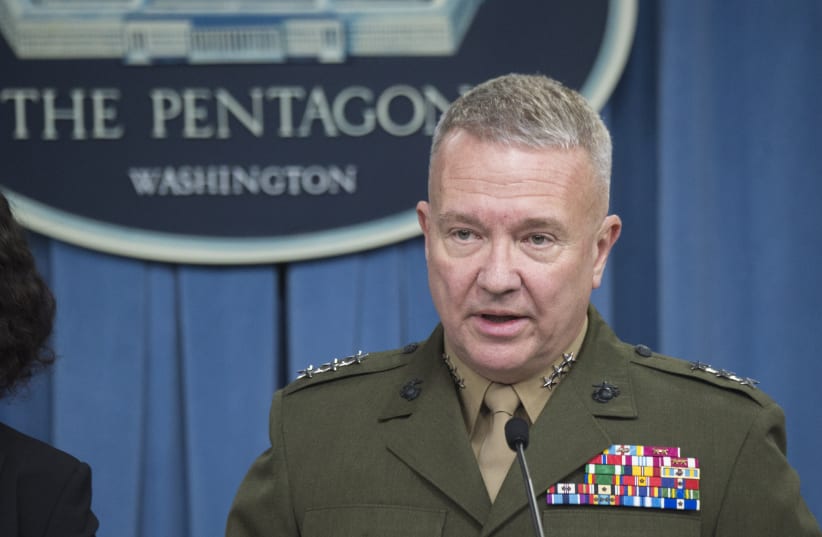Gen. Kenneth McKenzie, head of US Central Command, on Monday warned about Iran’s destabilizing activities and the roles of Russia and China in the Middle East.
During a special briefing, he spoke about his visit to Iraq and Syria and the US withdrawal from Afghanistan.
“Another priority is deterring Iran’s destabilizing activities, which remains the biggest threat to stability in the Middle East,” he said. “I believe that our posture in the region has had a deterrent effect on Iran and made it more difficult for them to deny attribution for their malign activities.”
Deterrence involves the US deploying ships, airpower and missile-defense capabilities, McKenzie said.
Regarding the role of Russia and China, he said they are seeking greater influence in the region and stronger ties with various countries.
Since 2015, Russia has increasingly intervened in Syria. It is also selling its S-400 anti-aircraft missile system to Turkey and has been welcomed by other US allies in the region, including Egypt and Saudi Arabia, in recent years. Russia also has contractors in Libya and a footprint in Africa.
Russia and China sense a decline in US “engagement” in the region, McKenzie said.
“China engaged with nearly every country in the region in 2020, using exploitative debt traps, the Belt and Road Initiative and medical diplomacy with their vaccine, which has dubious efficacy, to try to expand its influence,” he said. “Russia is equally disruptive in the region, and their engagements are largely opportunistic and transactional.
“Russia seeks ways to position itself as an alternative to the West by offering to mediate regional conflicts, selling arms, offering military expertise and participating in regional and multilateral organizations to advance their interests.”
Regarding Syria, where the US has a close partnership with the Syrian Democratic Forces, which includes many Kurds, Christians, Arabs and other groups, McKenzie said the US was still in the fight in the war against ISIS.
There are concerns among observers that the US may cut funding to the SDF, and there have been clashes in Manbij and Turkish threats to security.
In the long term, “we’d like to transition this to local security organizations that are going to be able to provide this kind of security without a significant investment and international support,” he said. “That’s still in the future, but that is ultimately the direction that we would like to move.”
The US is also continuing to support the Lebanese Armed Forces, McKenzie said. Recent posts on social media have included messages of US support. Many wonder how the US can work closely with the Lebanese army when Hezbollah has massive control of Lebanon.
“We remain committed to supporting the Lebanese armed forces,” he said. “They’re one of the elements of the government of Lebanon that actually functions very well, and we believe they should continue to be the sole expression of military power of the state in Lebanon. I had a good visit there a couple of months ago, where I met with the chief of defense.”
He stressed the importance of training for the Lebanese.
McKenzie addressed the US Fifth Fleet seizing a ship destined for Yemen that allegedly was carrying weapons from Iran. It is at least the fourth ship seized in 18 months. Iran arms the Houthi rebels in Yemen with drones, missiles and other technology.
Asked about the ship, he said: “Yes, we seized a ship... and a large number of weapons on it in very suspicious circumstances. We are still finalizing attribution for this because we want to be very careful before we go public with who we believe is associated with it.”
The US military continues to work closely with Saudi Arabia on improvement of their integrated air and missile defense, McKenzie said.
“That’s a very high priority for us, as it is with Saudi Arabia, because they are subjected to really an unceasing bombardment from the Houthis in Yemen through ballistic missiles, small drones and land-attack cruise missiles,” he said. “And these attacks are not helpful; they’re certainly not helpful to try to find an end to the conflict in Yemen. And so we work very hard with the Saudis to enable them to defend themselves. So that work is going on, and I’m pleased with the results that we’ve made.”
The US has been criticized by some for supporting the Saudi-led war in Yemen. Saudi Arabia says it is supporting the government of Yemen against the Iran-backed Houthis. But the war has dragged on for years. The new US administration wants to shift to only helping Saudi defensive capabilities.
“I am personally convinced the Kingdom of Saudi Arabia seeks a responsible political end to the conflict,” McKenzie said. “I am convinced they’re willing to take significant steps to make that happen. Unfortunately, I do not believe the Houthis are ready to seize the moment, and they have an opportunity here to enter good-faith negotiations with the Kingdom of Saudi Arabia to bring an end to this conflict.”
